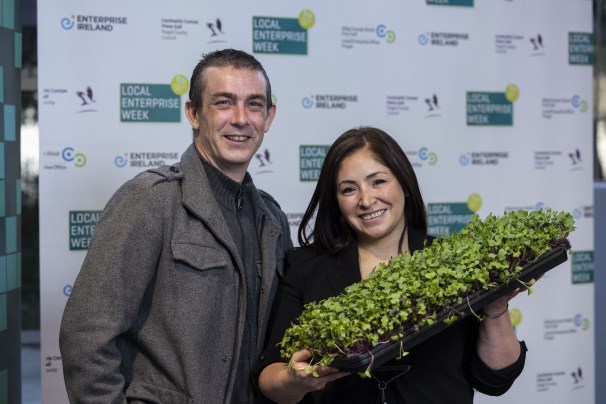
Paul Curry, Chef by trade, saw an opportunity to grow Microgreens in Ireland when he found it complicated to get good quality Microgreens. He talked to Carol who he knew would complement the project. In 2018 the project started when Paul and Carol discovered an unused green house and decided to get the project started. Nowadays they rent a glass house to grow Microgreens and a Polytunnel to grow Edible Flowers.
Growing Microgreens in Ireland is a challenge as they require consistent light, temperature levels and daily monitoring. Carol and Paul carefully monitor the needs of their plants and grow them without the use of fertilizers or pesticides. They are harvested at the peak of freshness to guarantee a quality product.
Carol and Paul choose to take part in the Green for Micro Programme to improve their environmental performance. They hope to reduce their water usage by 60% in order to demonstrate to their clients that they are truly green by utilizing as much rainwater as possible and cut cost by introducing energy efficiency savings. Carol decided to install a rainwater harvesting system to initially wash all of the seed trays, as well as a filtration system, to ensure that the water can be used in the next phase of watering the plants in 2023 and beyond.
Their system collects run-off from the area's roof via gutters and drainpipes, after which the flow is passed through a fine filter to collect leaf filter, which removes leaves, twigs, and other light debris. The water then drains into the storage tanks. The collected water is then pumped to the location where it is needed to meet their daily cleaning schedule.
Culinary Herbs can save energy by turning off all non-essential equipment at night and on weekends to save energy. Use timers and zone controllers for heating, air conditioning, and lighting. Maintain the hot water supply temperature in the 50-60° range for general washing purposes. Make sure all windows and skylights are cleaned at least once a year. Replace tungsten bulbs with compact fluorescent lamps; they save energy and last longer.
A desktop feasibility study was also completed to assess using solar panels as a renewable energy source in the future. Solar PV is designed in a modular manner, making it simple to expand the system in the future. For every kwp of solar PV installed on a south-facing roof, typical solar generation will be around 800-835 kwh of electricity. EDDI device is recommended be included, which can divert excess electricity generation to two immersions of up to 3.5kw.
Paul and Carol recognise the growing importance of sustainability and recognise that good environmental performance makes good business sense. The Green for Micro Programme, profiles how adopting greener strategies in areas such as resource efficiency and carbon footprint reduction will have an impact on current performance and provide improved efficiencies.
As part of the Green for Micro Programme Paul and Carol created their Environmental Policy Statement. Making a policy statement demonstrates that good environmental practices are followed throughout the organization. Businesses need to ensure that good environmental practices are followed throughout the organization. Improved environmental performance will help a business achieve a competitive advantage through greater resource efficiency, compliance requirements, and a larger market share through enhanced environmental/green credentials.
° Read more about The Green for Micro Programme here
° To apply for The Green for Micro Programme click here